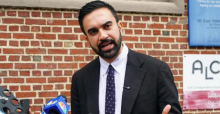
They tried. Oh, did the media try.
The declared victory for Zohran Mamdani, a democratic socialist, in the Democratic primary for New York City mayor highlights many things. The power of his campaign, the popularity of his ideas, the importance of grassroots get-out-the-vote mobilization, and the tepid reception for Andrew Cuomo, who resigned as the state’s governor due to a myriad of sexual harassment allegations, all contributed to the surprising—to corporate media, anyway—result.
Earlier this month, FAIR’s Raina Lipsitz (6/13/25) responded to a New York profile (5/20/25) that attempted to undermine Mamdani’s record. In the home stretch of the primary race in the latter half of June, the pressure against Mamdani increased, featuring thoughtless dismissals of his ideas, selective memory and factual inaccuracy in the service of lowering Mamdani’s electoral chances.
That Mamdani emerged from this mess victorious exposes the out-of-touchness of establishment media outlets that twisted like pretzels to scare voters away from the 33-year-old phenomenon. (Readers should know that I ranked Mamdani first in the primary and contributed to his campaign. I’m not unbiased when it comes to who I want to see as mayor, but the analysis of the media that follows, I believe, will withstand scrutiny.)
‘Uniquely unsuited to the city’s challenges’
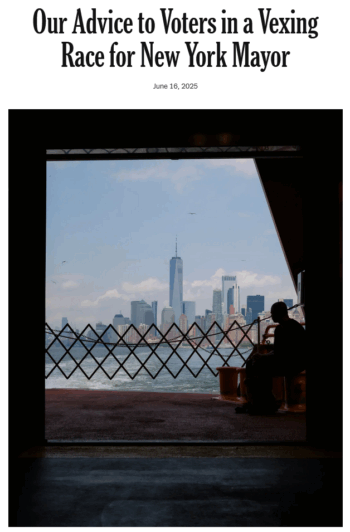
The New York Times‘ attack (6/16/25) on Zohran Mamdani was accompanied by an image centered on the World Trade Center.
The New York Times editorial board (6/16/25) argued that “Mr. Mamdani is running on an agenda uniquely unsuited to the city’s challenges.” They explained:
He is a democratic socialist who too often ignores the unavoidable trade-offs of governance. He favors rent freezes that could restrict housing supply and make it harder for younger New Yorkers and new arrivals to afford housing. He wants the government to operate grocery stores, as if customer service and retail sales were strengths of the public sector. He minimizes the importance of policing.
At least one poll shows that a rent freeze is overwhelmingly popular (City and State, 4/15/25), and they’re far from unheard of: Rent freezes were a key policy victory under Mayor Bill de Blasio (City Limits, 6/28/16; Politico, 3/15/17; WNBC, 6/17/20), a mayor whose candidacy the board (9/5/17, 11/2/17) had enthusiastically supported.
The landlord class, which has organized against Mamdani’s campaign (Jacobin, 6/23/25), no doubt agrees with the Times‘ argument that if we don’t let rents go up, housing will be unaffordable—though 12 years of steady increases on regulated rentals under the tenure of Mayor Michael Bloomberg didn’t seem to make it easier to get an apartment here.
And is the grocery store pitch such a crazy idea? The rising cost of food, despite the Times’ framing, is a very real problem for New Yorkers (Daily News, 5/1/25). The city operates public housing, homeless shelters and hospitals—and a public education system that delivers daily meals to more than 900,000 students.
The Times (12/12/24) positively explored the idea of city-owned stores in its news pages, citing how cities like Chicago and Atlanta were exploring similar missions. But when Mamdani proposes it, the editors present it as a sign of kookiness.
‘The disorder of the past decade’
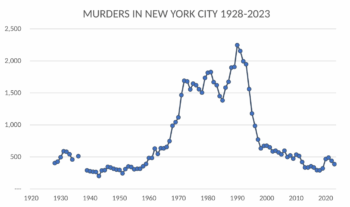
The New York Times (6/16/25) accused Mamdani of showing “little concern about the disorder of the past decade”—a time period when there were fewer killings in New York City than at any time since the 1950s (chart: Wikipedia).
The paper continued:
Most worrisome, he shows little concern about the disorder of the past decade, even though its costs have fallen hardest on the city’s working-class and poor residents. Mr. Mamdani, who has called Mr. de Blasio the best New York mayor of his lifetime, offers an agenda that remains alluring among elite progressives but has proved damaging to city life.
What disorder is the board talking about? We can guess they mean crime, but the homicide rate in New York City for the past ten years is the lowest it’s been since the 1950s. It’s true that Mamdani believes in police reform. The Times editorial board used to champion this cause (7/13/20, 9/13/20), even endorsing a reform-minded democratic socialist defense attorney for Queens district attorney five years ago (6/18/19).
Alex Vitale, professor of sociology at Brooklyn College and coordinator of the Policing and Social Justice Project, suggested that—”given that crime rates are at or near historic low”—the Times‘ “disorder” is likely “the presence of homeless mentally ill people on the subway and other public spaces.” But, he argues:
Ironically, Mamdani and to some extent [Comptroller Brad] Lander are the candidates who have actual plans to address the kind of disorder that pearl-clutching Times readers are worried about. They understand that the solution to this decades old problem is not endlessly using police to cycle people through jails and hospitals, but instead to develop actual supportive housing and other essential social services.
The Times has capitulated to neoliberal austerity, which accepts that cities have no choice but to cut services and turn the real estate market over to billionaires, and then use policing to manage the chaos that ensues.
As for the idea that Mamdani is somehow just a candidate for “elite progressives” but not the “working-class and poor,” the Times’ own interactive map shows a more nuanced story. While it’s true that Cuomo did well in, for example, the impoverished South Bronx, in Manhattan he won the monied districts like Tribeca and the Upper East and West Side, while Mamdani carried lower-income neighborhoods like Harlem, Washington Heights and the Lower East Side. Mamdani’s funding came mostly from small contributions—he had seven times as many donors as Cuomo (New York Times, 5/6/25)—whereas Cuomo was heavily funded by billionaires and the real-estate industry (City, 6/26/25).
‘A quality of magical realism’
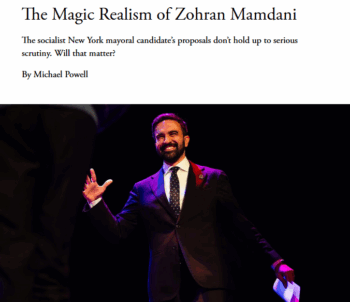
The Atlantic‘s Michael Powell (6/18/25) said Mamdani’s campaign was “exuberantly disconnected from actual government budgets and organizational charts.”
The Atlantic published two anti-Mamdani articles, with two of them warning that Mamdani is too inexperienced to earn the people’s vote and that his ambitious proposals can’t be achieved. (A third went after his support for the phrase “globalize the intifada—6/24/25.) Former Times writer Michael Powell (6/18/25), like the Times editorial board, scoffed at the grocery store idea, saying, “How would he pay for his most ambitious plans? Tax the rich and major corporations.” His colleague Annie Lowery (6/12/25) joined in:
He is a leftist in the Bernie Sanders mold, with a raft of great-sounding policies. Free buses! Free childcare! Cheap groceries! Frozen rents! But a lot of these are impractical at best. Free buses would deprive the MTA of needed revenue. Free childcare would require a mammoth tax hike that Albany would need to approve, which it has shown no interest in doing.
Similarly, Powell pompously asserts that “Mamdani’s candidacy also has a quality of magic realism, a campaign exuberantly disconnected from actual government budgets and organizational charts.”
Progressives are often annoyed by the retort “how are you going to pay for it?” because this question only gets deployed against the expansion of healthcare, education and social services, and not jails, policing and subsidies for business. But it also exposes the superficialities of reporters’ knowledge of city affairs.
Many years ago, when I was a reporter at the Chief-Leader, a fellow reporter asked then-Mayor Michael Bloomberg why his budget proposal rested so much on the outcome of the city’s negotiations with its unions. His answer was simple: That’s what government is—it’s services for people, staffed by people. Any administration, in short, has to grapple with how to pay for its priorities, whether those priorities are left-wing or right-wing, and that often involves cutting bloat, consolidating functions and increasing revenue.
Mamdani’s spending plan offends the Atlantic, not because it costs money—the magazine (8/8/21, 3/8/23) has argued against efforts to cut police budgets—but because Atlantic writers and editors don’t like his budget priorities, which validate the New Deal concept of government services for the 99 Percent.
‘Undeniably young’
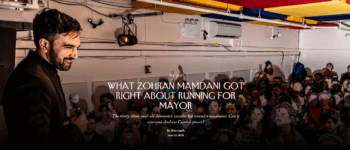
What Zohran Mamdani got right, according to the New Yorker (6/23/25), is understanding that “social media is where many voters decide if a politician…can be counted on.”
New Yorker coverage has been fairer to Mamdani than the Atlantic was, but Eric Lach’s interview (6/23/25) with the candidate honed in on a swipe favored by the assembly member’s critics, including the New York article FAIR already responded to: his youth. Lach said:
Mamdani has been stymied for several reasons that were apparent before primary day. For one thing, he is undeniably young, and he never found a way to reassure voters that he was truly up for the job of managing the city’s agencies, its $100 billion budget, and its 300,000-person workforce.
Democratic socialist upstarts have often been tagged as unruly whippersnappers who need to stop bothering party elders with competitive primaries. But in a moment where one of the biggest problems of the Democratic Party is its gerontocracy (Newsweek, 12/19/24; The Nation, 5/23/25; Atlantic, 6/19/25), perhaps Mamdani’s ineligibility for AARP membership is a strength.
Lach continued:
The new program of public spending he has proposed is predicated on increasing taxes on the wealthy and corporations, taxes that would have to be approved in Albany. If the big shots in Albany—never a good bet for anything, politically—refuse him, what would become of Mayor Mamdani? No one can say.
Warning that Mamdani’s agenda might cause friction with Albany suggests it might be Lach, not Mamdani, who is too new to the subject matter. The tension between state and city government is age-old, and consistent with every administration.
Once again, Mamdani gets extra scrutiny because of the substance of his agenda. Would Cuomo deal better with the state government he was forced to resign from, with a governor who is the deputy who replaced him? That’s a rhetorical question.
Right-wing rage
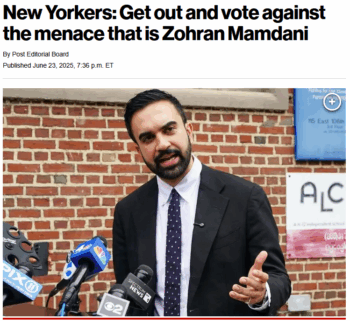
Marvel Comics‘ Daily Bugle used to run headlines like “Spider-Man: Threat or Menace?” The New York Post (6/23/25) is less ambivalent about Mamdani.
It is not surprising that Rupert Murdoch’s editorial boards savaged Mamdani. The New York Post (6/23/25) called him a “cheap influencer” and “a babyfaced socialist antisemite who’s never accomplished anything except this so-buzzy campaign.” Likewise, Murdoch’s pro-business Wall Street Journal (6/22/25) claimed that “Manhattanites are warning that Mr. Mamdani’s ruinous utopianism could prompt a flight of talent and capital.”
But the onslaught from the more centrist outlets is telling: Like the business establishment, they fear progressive economic policies when it comes to housing, education, transit and public safety, despite all overtures to the contrary.
The good news is that this press assault failed. Perhaps that is because the political advice of the New York Times and Atlantic only still sways opinion in a few enclaves of the upper crust. The rage from the Post, Daily News and Journal probably only reached conservative audiences, who wouldn’t have ranked Mamdani anyway. And perhaps it also is testament to the degree that a grassroots messaging campaign can overcome an onslaught from the corporate media.
The bad news is that this was only the primary: incumbent Mayor Eric Adams will be running in the general election as an independent, and Andrew Cuomo has left that option open. Monied interests will likely double down, hoping to spread enough fear of a Mamdani-run New York City to help sink his meteoric rise—and elite media are rarely far behind them.
By Ari Paul
